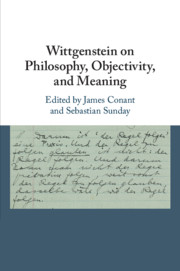Book contents
- Wittgenstein on Philosophy, Objectivity, and Meaning
- Wittgenstein on Philosophy, Objectivity, and Meaning
- Copyright page
- Contents
- Contributors
- Preface
- Acknowledgments
- Chapter 1 Anatomy of a Muddle: Wittgenstein and Philosophy
- Chapter 2 Explaining What We Mean
- Chapter 3 Objectivity
- Chapter 4 The Methodological Significance of Intuitions in Philosophy
- Chapter 5 Wittgenstein on ‘Seeing Meanings’
- Chapter 6 Bringing the Phenomenal World into View
- Chapter 7 First Steps and Conceptual Creativity
- Chapter 8 Wittgenstein and Analytic Revisionism
- Chapter 9 Demystifying Meaning in Horwich and Wittgenstein
- Chapter 10 What Is Meaning? A Wittgensteinian Answer to an Un-Wittgensteinian Question
- Chapter 11 Meaning, Use, and Supervenience
- Chapter 12 Some Socratic Aspects of Wittgenstein’s Conception of Philosophy
- References
- Index
Chapter 8 - Wittgenstein and Analytic Revisionism
Published online by Cambridge University Press: 15 August 2019
- Wittgenstein on Philosophy, Objectivity, and Meaning
- Wittgenstein on Philosophy, Objectivity, and Meaning
- Copyright page
- Contents
- Contributors
- Preface
- Acknowledgments
- Chapter 1 Anatomy of a Muddle: Wittgenstein and Philosophy
- Chapter 2 Explaining What We Mean
- Chapter 3 Objectivity
- Chapter 4 The Methodological Significance of Intuitions in Philosophy
- Chapter 5 Wittgenstein on ‘Seeing Meanings’
- Chapter 6 Bringing the Phenomenal World into View
- Chapter 7 First Steps and Conceptual Creativity
- Chapter 8 Wittgenstein and Analytic Revisionism
- Chapter 9 Demystifying Meaning in Horwich and Wittgenstein
- Chapter 10 What Is Meaning? A Wittgensteinian Answer to an Un-Wittgensteinian Question
- Chapter 11 Meaning, Use, and Supervenience
- Chapter 12 Some Socratic Aspects of Wittgenstein’s Conception of Philosophy
- References
- Index
Summary
Throughout his career, Wittgenstein’s philosophical attitude was characteristically non-revisionist: philosophy as he conceives it does not change established concepts or practices, but leaves everything as it is. This essay seeks to understand Wittgenstein’s non-revisionist conception by contrasting it against the views of the two most prominent and self-conscious revisionists in the analytic tradition: Carnap and Quine. This comparison in turn serves to reveal continuities and discontinuities between Wittgenstein’s early and later versions of philosophical non-revisionism, and these continuities and discontinuities are in turn related to some central developments in his thought on language, logic, and the nature of philosophical perspicuity. Finally, it is argued that the revisionist methodologies of Carnap and Quine are fundamentally question-begging.
- Type
- Chapter
- Information
- Wittgenstein on Philosophy, Objectivity, and Meaning , pp. 143 - 163Publisher: Cambridge University PressPrint publication year: 2019
- 1
- Cited by

